MY first memory of Munich is of beer. It’s a very hazy one. Three teenage chums en route for Venice stopping off for a few hours between trains in the Bavarian capital. Most of those spent in the Hofbräuhaus, the world’s most famous beer hall, supping litres of heavy Dunkel. Afterwards, an overnight rail journey of pounding head and heaving innards. Prost!
A dark mahogany beer that smells of bananas and marzipan
Adult visits since have concentrated on culture and history and when beer has been taken, accompanied by large plates of pork, potatoes and and fermented cabbage – the ultimate stomach lining. Usually, though, I’ve stuck with renegade glasses of Riesling and sought out sushi, that most un-Teutonic of treats.
Still you can hardly go back in 2016, as I did, to celebrate 500 years of the Reinheitsgebot – the German Beer Purity Law ruling that barley, water and hops alone be used in brewing – without toasting the epicentre of it all with lashings of amber nectar (or whatever is the German equivalent).
There’s a lot of it about. My figures are a couple of years out of date but are still staggering (sic). Munich’s seven big breweries – Augustiner, Hofbräu, Paulaner, Hacker-Pschorr, Löwenbräu, Spaten and Franziskaner – produce 160 million gallons of beer a year.
Of this close to two million gallons are downed during the annual Oktoberfest alone. It is celebrated in a rather sedate museum www.bier-und-oktoberfestmuseum.de, tucked away on Sterneckerstrasse, in a private house dating back to 1340, which back in the day earned extra cash brewing and selling beer to passers-by. It still serves it from wooden barrels.
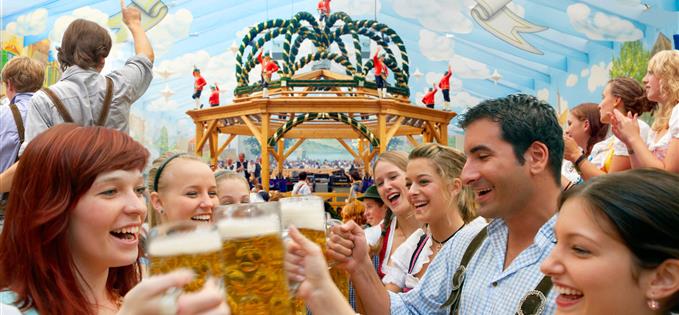
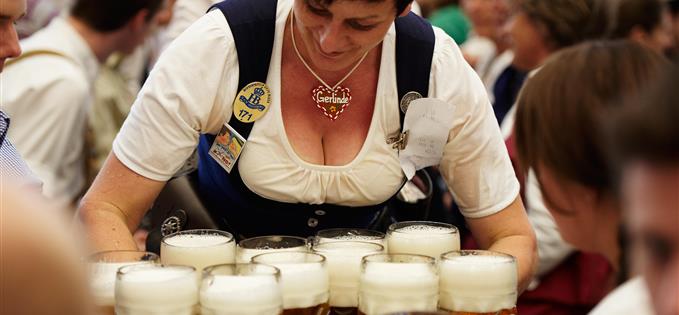
Oktoberfest is huge business for the city. The oompah bands and lederhosen and red-faced jolliness soon lose their appeal for me, but some six million folk from around the world are expected to roll up for the 2016 mega piss-up, which runs from September 17 to October 13.
Many will fly in and won’t be able to resist ‘getting the taste’ at Airbräu, Munich Airport’s own rather gemütlich brewery tap.
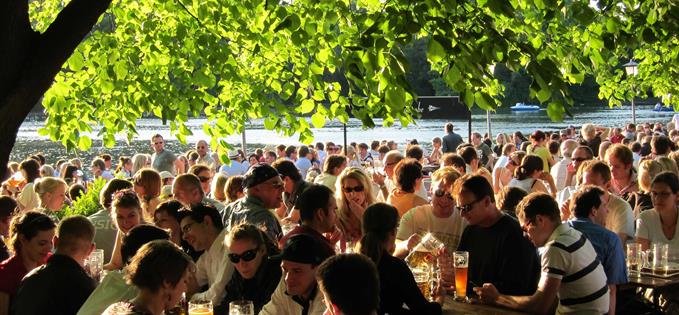
It’s the first in my Top 10 Munich Beer Destinations to slake your thirst in year round.
If you need to take in any other sights (or are teetotal) check out my 10 Things to Do in Munich. That essential list does recommend the historic Augustiner Bräuhaus, for which I have a soft spot for as the only family-run big beer player left – they stumped up the backing for the Oktoberfest Museum – plus the BMW Museum in Munich’s Olympic Park, which I was a bit sniffy about. After a visit this time, I’m not. Cars are not my thing, but the quality of its architecture helps it transcend accusations of being a showroom vanity project. Still after all that petrol-heading I did feel in need of a little refreshment. Eine kleine Erfrischung bitte.
My Top 10 Beer Destinations
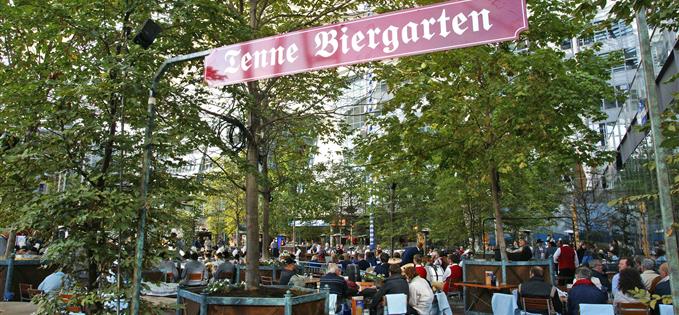
1 Airbräu A brewery inside an airport is a novelty. Munich’s has been running since 1999 in the Airport Center. Today it produces eight different brews with prices starting at an amazing 2.75 euros. Check out the award-winning Jetstream pils. You can even watch master brewer René Jacobsen (below) conduct brewing sessions before the beer is stored in 530 gallon kettles.
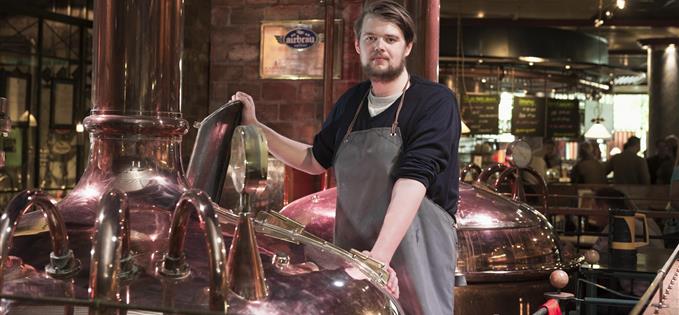
There is a variety of rooms inside the tap, but aim for the large beer garden, open May to October, 8am to 1pm and seating 600 visitors under shady trees. Food is trad, including Bavarian speciality Weisswurst – a boiled white sausage made from minced veal and back bacon and served with sweet mustard and pretzels. It’s everywhere in the city and quite addictive. But note, eating it after noon is taboo.
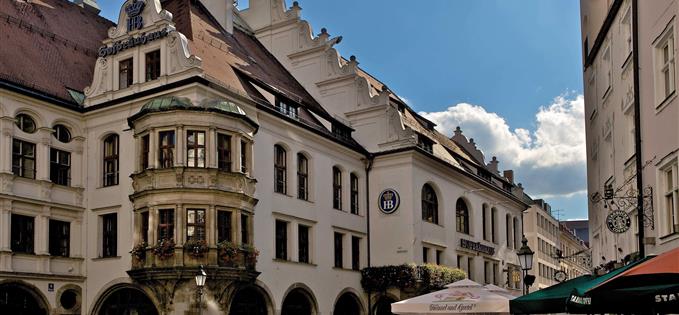
2 Hofbräuhaus Dating back to 1598 as the royal court brewery, my nemesis as a teenager has occupied its current massive site since 1896 and has witnessed all the 20th century upheavals the city has survived. In 1919, the Munich Communist government set up their HQ in the beer hall, and a year later Adolf Hitler and the National Socialists held their first meeting in the Festsaal, the Festival Room, on the third floor.
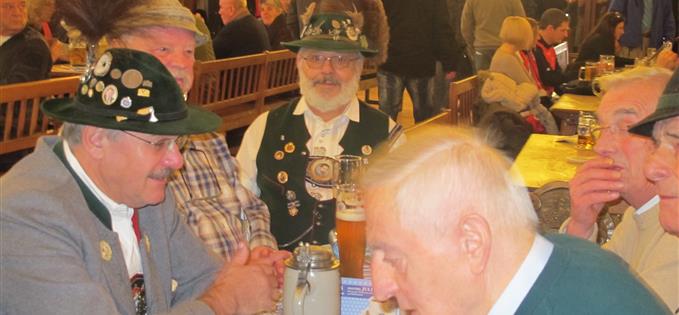
Today Lederhosen-clad locals still store their steins here and down prodigious amounts of Helles light) or Dunkel (dark) beer according to the season. Perfect accompaniment? Soft pretzels called Brezn, spread with Obatzda, a soft cheese and butter dip sprinkled with paprika. Expect brass bands and choruses of ’n München steht ein Hofbräuhaus, oans, zwoa, g’suffa!" (‘There's a Hofbräuhaus in Munich—one, two, down the hatch!’)

3 Löwenbräukeller World famous Löwenbräu (‘Lion's brew’ in German) is now owned by multi-nationals Anheuser-Busch InBev and is perhaps the best known Munich beer brand export. Nearer home, it is one of the big supporters of Oktoberfest, brewing a special Märzen style beer called Wiesenbier (‘meadow beer’, referring to the festival site, the ‘Wiesn’) and retains its spectacular Löwenbräukeller on Stiglmaierplatz. Created in 1883, it has a pub, large beer garden band ballroom. Visit it in March for the tapping of the first Triumphator barrel, ringing in the ‘fifth’ season – for Bock strong lager.
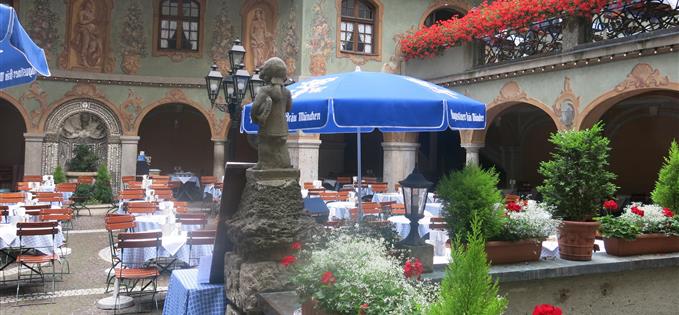
4 Augustiner Bräuhaus There is no better Munich summer haven than Zum Augustiner’s Arkadenhof – a flower-decked courtyard with attractive murals off bustling Neuhauserstrasse. To get to it, walk through the privately-owned (est 1328) Augustinerbräu’s atmospheric beer hall/restaurant. Alternatively, in winter cosy up in the Jugendstil warren of rooms – pick is the Muschelsaal, a shell-lined room.
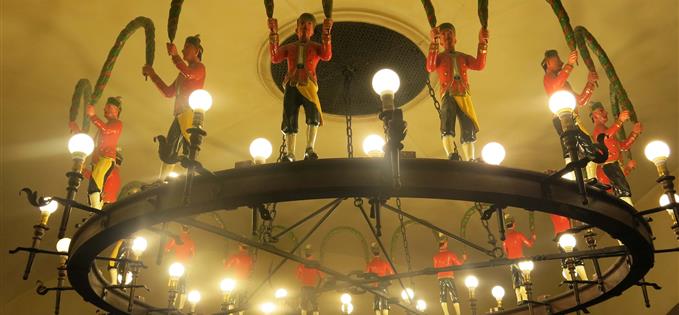 Barrelmaker light fitting in the Augustiner Keller
Barrelmaker light fitting in the Augustiner KellerNot that mussels are likely to be on the menu. Meat rules across their all-day menu. Here’s the place to wolf down Jagerpfanderl mit Schweineruckensteak und Speckscheibe vom Grill, Hirschkalbspflanzerl, Rahmschwammerl und Eierspatzle, Bratenpfanderl mit Geflugel, Schweinebraten und Haxe, Kartoffelknodel und Krautsalat. Loosely translated, if not entirely digested, this consists of overbrimming platters of pork, chicken, veal, sauerkraut salad, creamy sauce, dumplings and egg noodles.
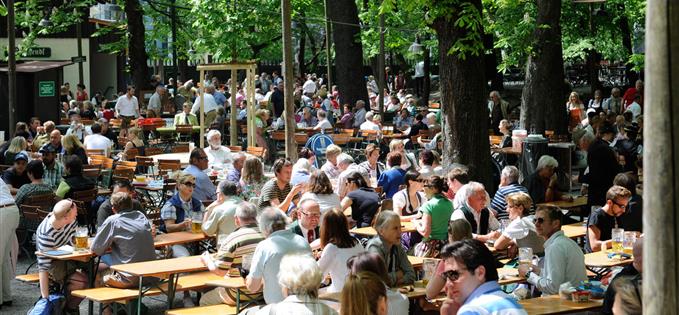
All this is secondary to the city’s best-loved beers poured straight from the barrel, only available elsewhere in rigorously selected outlets. Aficionados recommend the brewery’s own Augustinerbräustube (above) out on Landbergstrasse, a short tram ride from the centre, which has a huge hall and beer garden and draught horses to pet.
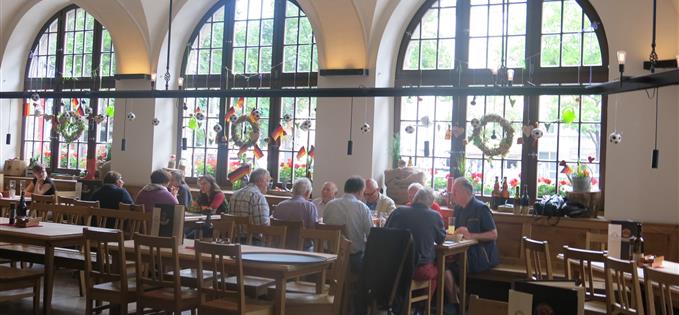
5 Paulaner Bräuhaus Just as Augustiner is named after the monks that first brewed beer in the city, so the giant Paulaner is named after Francis of Paola, founder of the mendicant Minim friars, who established the brewery in Neuhauserstrasse in 1634 (they were allowed to sell the beer on holidays), Today it is corporation-owned, but the Bräuhaus in Kapuzinerstrasse is a groundbreaking brewpub side project, selling alongside the standard range ‘experimental’, beers.
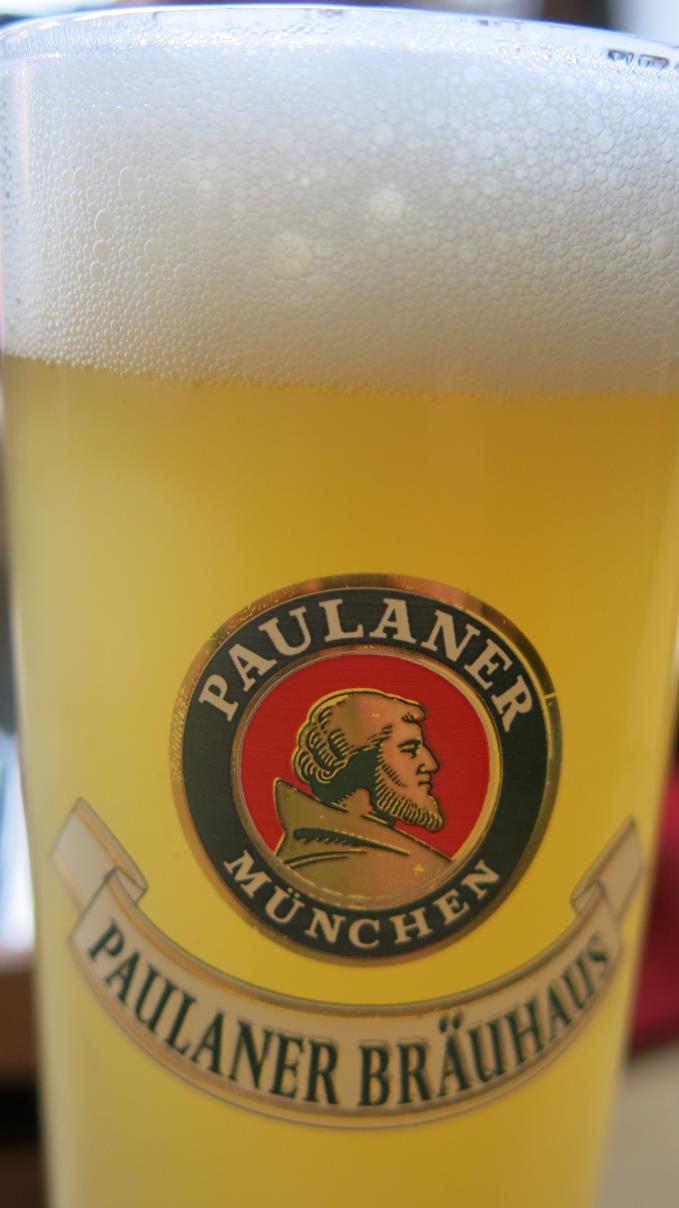

We met brewer Uli Schindler before lunch there. He was excited at just having produced an IPA. With lunch we liked his delicate citrussy wheat beer, but were less enamoured of his smoked beer. It’s a bold step but small beer compared with the vast variety of styles unleashed by the US and UK-led craft beer revolution, unencumbered by the Reinheitsgebot and stultifying tradition.
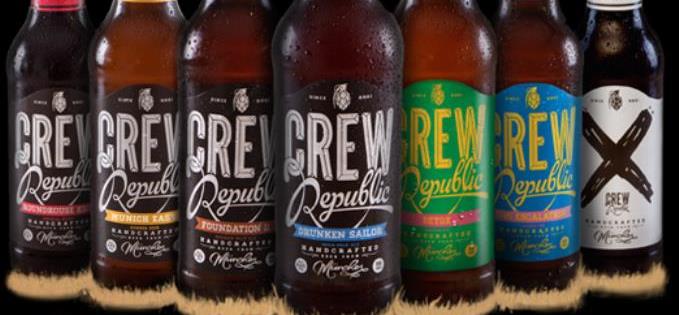 Crew Republic
Crew Republic6 Cabin Crew and Tap-House Munich Attempting to shake up the smug scene are hopster iconoclasts Mario Hanel and Timm Schnigula of Cabin Crew, who invented “Craft Beer is Not a Crime” as their motto and produce a range of outsider beers unthinkable in Munich not long ago. Try their 7.45 Escalation Double IPA or Roundhouse Imperial Stout. If you can find them.
One amazing establishment I was told stocks them, is the restored Goldene Bar on Prinzregentenstrasse. It sits inside the monumnetal Haus der Deutschen Kunst (House of German art) built in 1937 for the glory of the Third Reich. If the beers aren’t available they have a fine cocktail list! A more conventional outlet, which even stocks imported US craft beers is Tap-House Munich on Rosenheimer Strasse.
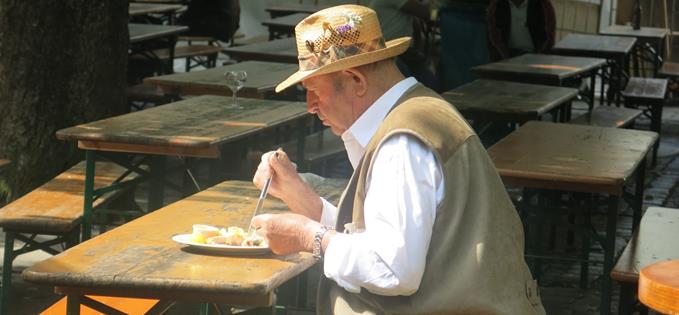
7 Bio beer in the Food Market Landshut is a little town 70km north that exports its tasty, pure Zwickl Bio-Bier to Munich, where you can sample it from their Stubl on the Viktuellenmarkt (Food Market), the best spot in the Old Town to sit in the shade with a beer (or grab breakfast, above). The Landshuter Brewery produces a range of organically certified beers – so extra Reinheit for your euro.
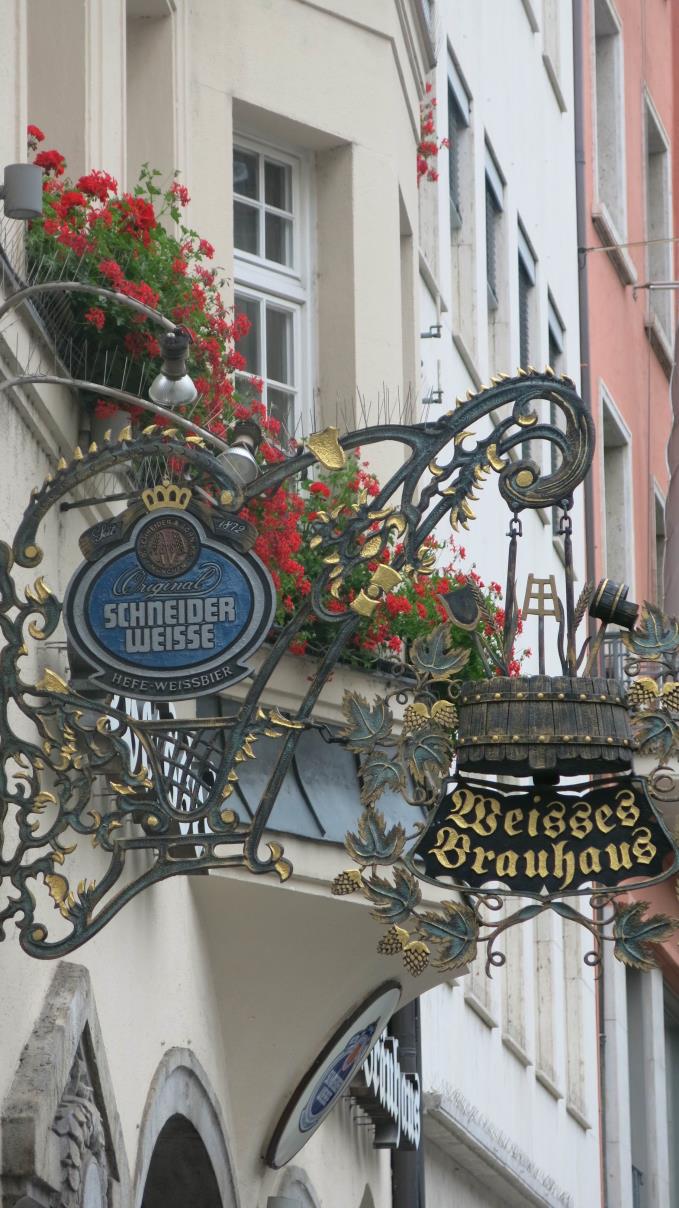
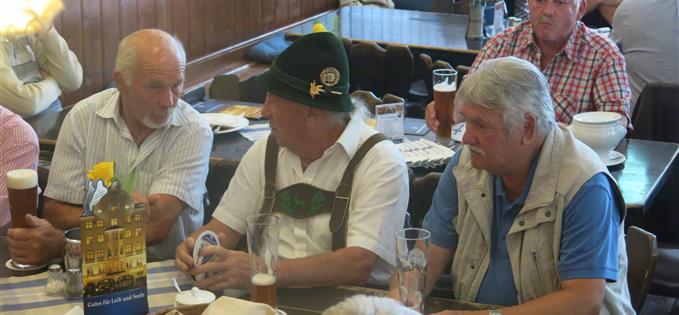
8 Weisses Bräuhaus Another outsider is wheat beer specialists Schneider, who brew in the tiny Bavarian toewn of Kelheim but have gained international recognition for their classic Schneiderweisse and Aventinus, an Eisbock – produced by a special freezing method. This is brewed with 60 per cent wheat malt and 40 per cent barley malt, creating a dark mahogany coloured beer that smells of bananas and marzipan and is ultra smooth on the palate. It’s also 8.2 per cent ABV, hence my enforced siesta after sampling a couple of large glasses at Schneider’s glorious Weisses Bräuhaus, where Georg Schneider I, brewed his first Schneider Weisse Original in 1872.
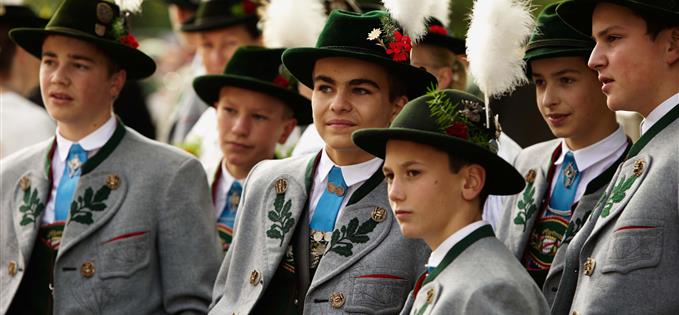
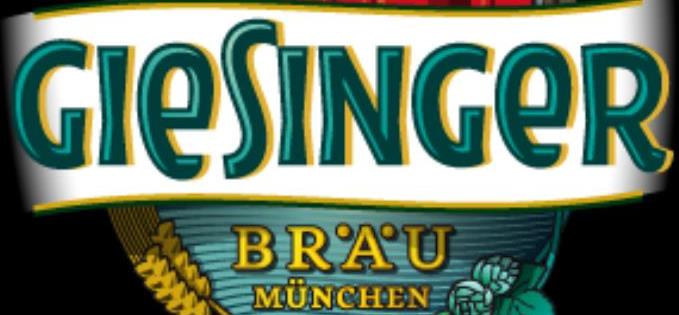
9 Giesinger Bräustuberl I first tasted Giesinger from a stall at Munich Christmas Markets and still have the glass to prove it. Owner Steffen Marx started up this small-scale gem as a nano-brewery in his garage and expanded via guerrilla marketing. He makes unfiltered, unpasteurised Märzen, wheat beer, Helles and dark beer in small quantities. You can buy it at craft beer shops or taste it in their own welcoming brewhouse across the River Isar in Martin-Lutherstrasse.
10 Wide open spaces – Englischer Garten and Hirschgarten It’s lovely to sit out in the Arkadenhof or indeed among the chestnut trees of the Paulaner Bräuhaus yard, but explore further afield and discover beer gardens that feel more like the real countryside. I’d recommend two in particular – the Seehaus im Englischer Garten and the Hirschgarten.
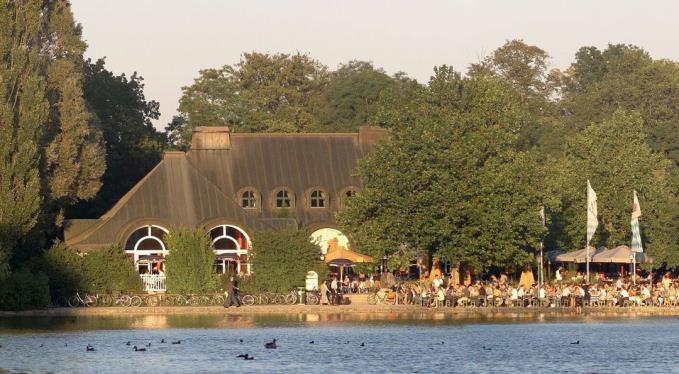
The former is a lakeside pavilion and beer garden in Germany’s largest public park – 922 acres of trees, trails and a substantial lake, the Kleinhesseloher See. Sip your Paulaner wheat beer on its banks and then take in the Englischer Garten’s biggest photo opportunity, the Chinesische Turm (Chinese Tower). The latter, family-friendy and fun, is Munich’s biggest, seating 8,000 and feeding over 1,000 in a parkland setting. Maybe you could treat it as an acclimatiser for the Oktoberfest!
Limber up for the above by visiting the appropriately titled ‘Munich – Powered by Beer’ exhibition, which is on at the Münchner Stadtmuseum until January, 2017. It, of course. celebrates the Duke of Bavaria’s 1516 beer edict, which only much later came to be called the Reinheitsgebot. A year later Martin Luther tacked the 95 Theses to a Wittenberg church, sparking the Protestant Reformation. Now that anniversary should be some party.
Factfile
Neil Sowerby stayed at the first class deluxe MARITIM Hotel, Goethestraße 7, 80336 Munich. Tel: +49 89 552350. It boasts 347 elegantly furnished rooms, two restaurants, a piano bar, traditional beer garden and indoor rooftop swimming pool with panoramic views over the city. Close to the central railway station, it is within walking distance of the main shopping and sightseeing areas, all of which can be reached comfortably on foot from the hotel. One night’s accommodation in a Double Classic Room starts from only 130 euros, including free WiFi and use of the wellness centre. The international breakfast buffet is available at 24 euros per person.
Getting there Neil Sowerby flew there with Singapor Airlines but they have now discontinued their service from Manchester. Lufthansa offer 20 direct flights a week to Munich from Manchester. Economy fares from £97; busisness from £273.
Get information for your stay from the Munich Tourism website.
A City Tour Card is handy for exploring, giving unlimited access to all public transport and offering discounts to over 70 tourist attractions. It is available as a single or group day ticket for one, three or four days. For details visit this link.
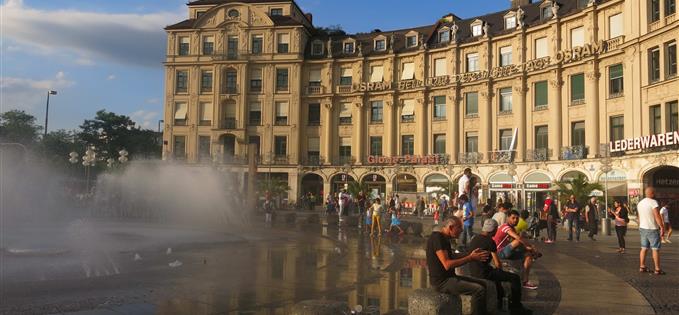
 Powered by Wakelet
Powered by Wakelet











